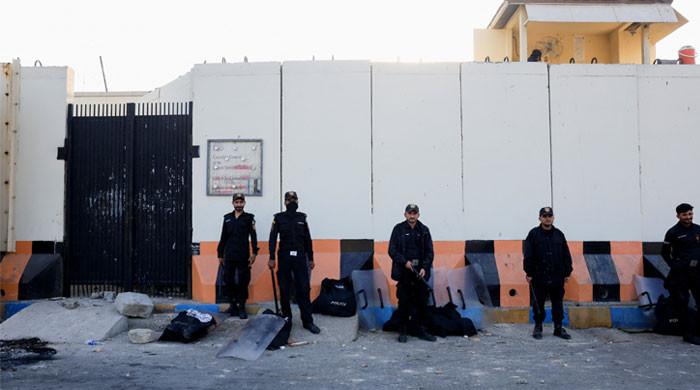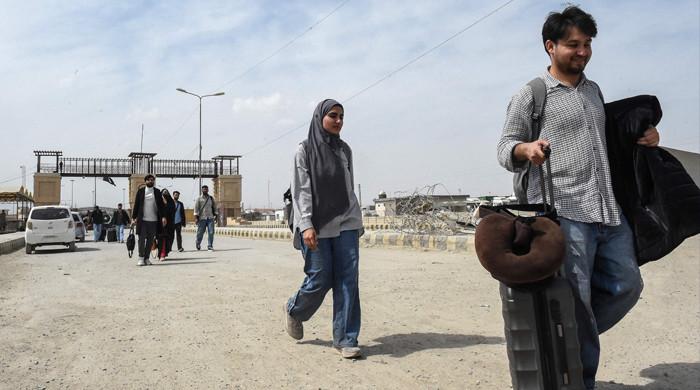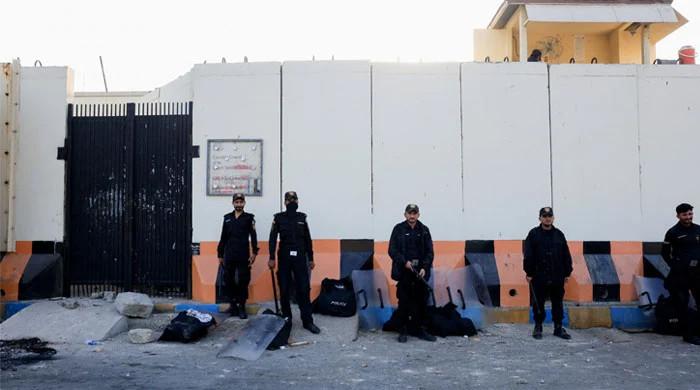Inheritance and insanity: Why are women first casualty of flawed laws?
"The judicial system falls short in effectively protecting and promoting women's inheritance rights," says lawyer
March 08, 2024
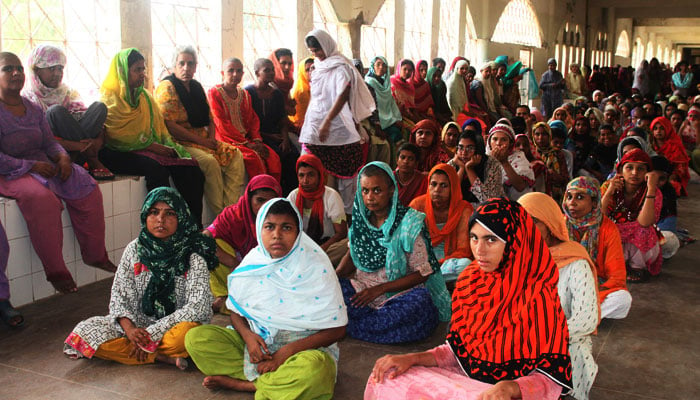
As the world celebrates International Women's Day with the theme "Inspire Inclusion," a crisis of highly unfortunate proportions continues to plague Pakistan — and its victims are mostly women and the perpetrators are their very own flesh and blood.
Denying women their legal inheritance birth rights by their avaricious families is so common that it hardly makes it to any major platform. This inhumanity is practised in many ways with impunity.
However done, it involves recruiting the sold-out system and worn-out traditions.
It is not just about breaking the rules; it's a really sad story about how society and culture treat women unfairly, making them feel stuck in a bottomless chasm of silence and sadness.
However, Pakistan strives to ensure that its women are treated with the same respect, value and equality, but a lot still needs to be done.
Today, women across the country continue to be deprived of their inheritance rights, which highlights the urgent need for reforms as women continue to fight the system and suffer consequences.
As women continue their struggle for rights, a troubling phenomenon is being witnessed in parts of the country: some women are being unjustly confined to mental and psychiatric institutions by their own families. This disturbing practice appears to be a means of depriving them of their rightful inheritance.
Based on 2022 data from the World Bank, nearly half of Pakistan's population, at 49.6%, comprises females.
However, a significant portion of these women is denied their inheritance rights, perpetuating financial dependence and reinforcing gender inequality.
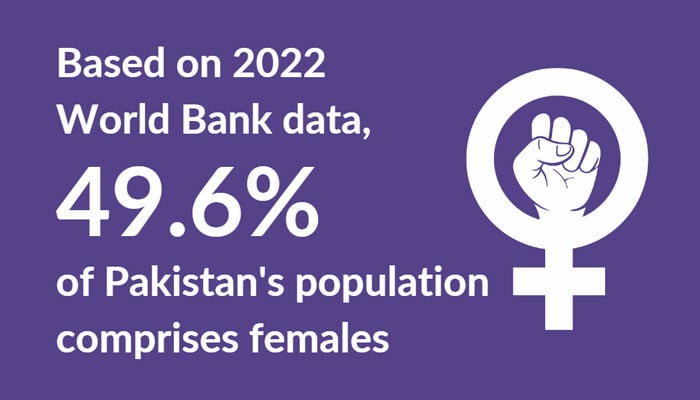
These horrifying transgressions were brought to light after individuals like Aisha and Fatima came forward to share their stories of systemic oppression.
Aisha, a 58-year-old woman, has spent over 30 years at the Edhi Foundation's psychiatric hospital. Her family admitted her to the mental asylum by falsely claiming she had lost her mind.
However, Aisha, still of sound mind, spends her days providing services at the facility. She revealed that her family restricted her to the lunatic asylum to seize her portion of the property.
Reflecting on her past, she recalled being the youngest of five siblings — four elder brothers and a sister. After her father's death, she was forcibly married to her paternal cousin, who subjected her to domestic violence for not bringing him a dowry to his heart’s desire.
Aisha, fearing for her safety, asked her brothers for her share of the inheritance. “Only then I discovered that they had already divided the property among themselves, leaving me and my sister with nothing,” she shared. Despite her efforts to claim what was rightfully hers, the 58-year-old ended up in the mental hospital as a result of demanding her lawful inheritance.
Similarly, Fatima, a dedicated volunteer at the hospital, shared her story and recounted how, after demanding her rightful inheritance, her family unjustly declared her a patient of depression and anxiety, using the stigma surrounding mental illness to silence her.
After spending a decade at an institute, she now calls the mental hospital her only home. She revealed the emotional details of her past, describing how her paternal uncles forcibly threw her in the asylum, alleging her of violent behaviour and claiming that she could not be kept at home.
"After three years of medication and therapy," Fatima recounted, "the mental health facility volunteers took me back to my home, located in Korangi. However, my family's rejection was a huge shock." With tears welling in her eyes, she added, "It felt like losing my home and family all over again. Despite being completely fine and sane, they refused to accept me."
Fatima's story sheds light on the misuse of mental illness taboos to suppress women's voices and deny them their rights.
Women’s right to inheritance and Islam
“Islam introduced rights for women in marriage, divorce, and inheritance, including acquiring wealth and possession of property,” shared Maryam Sheikh, a volunteer at the facility, who also provides primary Islamic teachings.
She quoted a verse from Surah An-Nisa: “For men, there is a share in what their parents and close relatives leave, and for women there is a share in what their parents and close relatives leave—whether it is little or much. ˹These are˺ obligatory shares” [4:7] and continued that the Islamic inheritance laws, as outlined in the Quran, prescribe a systematic and detailed framework for distributing assets among heirs.
Maryam, who has a Master's degree in Islamic Studies, further explained that Islam “encourages women to fight for their rights”. “Women, as daughters, wives, and mothers, are entitled to inherit based on their roles and relationships. No exemption in Islam permits any person to deprive women of their inheritance from their father,” she added.
Constitution of Pakistan
The Constitution of Pakistan also protects women’s property rights. Article 23 of the Constitution details the right to own property for every man and woman in the country.
Moreover, Article 24 guarantees that no person will be deprived of their property rights but by law, while Article 25 says that all citizens are equal before the law and there will be no discrimination based on sex.
Advocate Saba Panhwar, representing clients in inheritance cases for nearly seven years, shared that the legal process takes years to finalise in this country.
“One must provide all the required documents including certificates from the National Database and Registration Authority (NADRA) — Computerised National Identity Card (CNIC) and No Objection Certificate (NOC) — of legal heirs and death certificates of the deceased etc. If any legal heir denies, she may file suit for partition (under section 4 of the Partition Act, 1893) before the civil court of the area having jurisdiction," she said.
Saba addressed the common challenges women encounter in their legal struggles are stress, anxiety, depression, isolation, stigma and financial strain as expenses incurred while contesting a suit in court.
She also sheds light on the cultural and societal factors that hinder women's inheritance rights, stating: "Factors include traditional biases towards men, deep-rooted societal norms, discriminatory legal frameworks, and a widespread lack of awareness regarding women's inheritance rights."
Ali Ahmed, a senior lawyer at the Lahore High Court said that there were a lot of cases where people deprived their daughters and sisters of their right of inheritance through fraud.
Reflecting on the current legal and social framework, Ali remarked: "The judicial system falls short in effectively protecting and promoting women's inheritance rights. The issue with the legal framework lies in its lack of enforceability. While laws exist to secure these rights, their implementation is not as strong as it should be".
Providing a broader perspective on the situation, psychiatrist Dr Kulsoom Lashari, associated with the Edhi Home's psychiatric hospital since 2002, noted that families often brought in mental patients to relieve themselves of responsibility — a situation she finds unfortunate.
Dr Lashari, 51, who also practices at the Department of Psychiatry and Behavioral Sciences at the Jinnah Postgraduate Medical Centre, shared insights into the demographics of female patients in Edhi's psychiatric facility.

“Many of these women are orphans or victims of abuse. In contrast, others end up in mental hospitals due to drug use or involvement in sex work, often after being arrested by the police and later rejected by their families,” she explained.
Regarding treatments, Dr Lashari explained the hospital's approach to patient categorisation and care. "We categorise patients based on their condition during the initial diagnosis," she said. "Most are treated as stage-1 patients, which involves a combination of therapy and medication."
"The second and third stages focus on administering medication and monitoring recovery progress. We observe their recovery and discharge them from the hospital," she further added.
However, Dr Lashari expressed dismay over the lack of response from most families. “Consequently, the foundation assumes complete responsibility for female patients after their recovery and also provides them opportunities to build a better life,” she noted.
In 2022, the National Commission for Human Rights (NCHR), in collaboration with Taskeen Health Initiative (Taskeen) and with the support of the United Nations Population Fund (UNFPA), launched a report on mental health and human rights titled, “Malpractice in Mental Health in Pakistan: A Call for Regulation.”
The report identified the gaps in mental health policy, legislation, licensing, qualification, and ethical mental health service delivery to highlight the human rights violations and malpractice that those with mental health issues face as a consequence.
While efforts are underway, such as the establishment of District Enforcement of Inheritance Rights Committees in Punjab, the tragic anecdotes detailing Aisha and Fatima's lives highlight the challenges faced by women in Pakistan regarding inheritance rights and the disgrace associated with mental health.
The oppression through psychiatry and the denial of inheritance rights for women demands urgent and comprehensive reforms in mental healthcare as well as strong enforcement mechanisms for inheritance rights to ensure women’s rights are protected.







